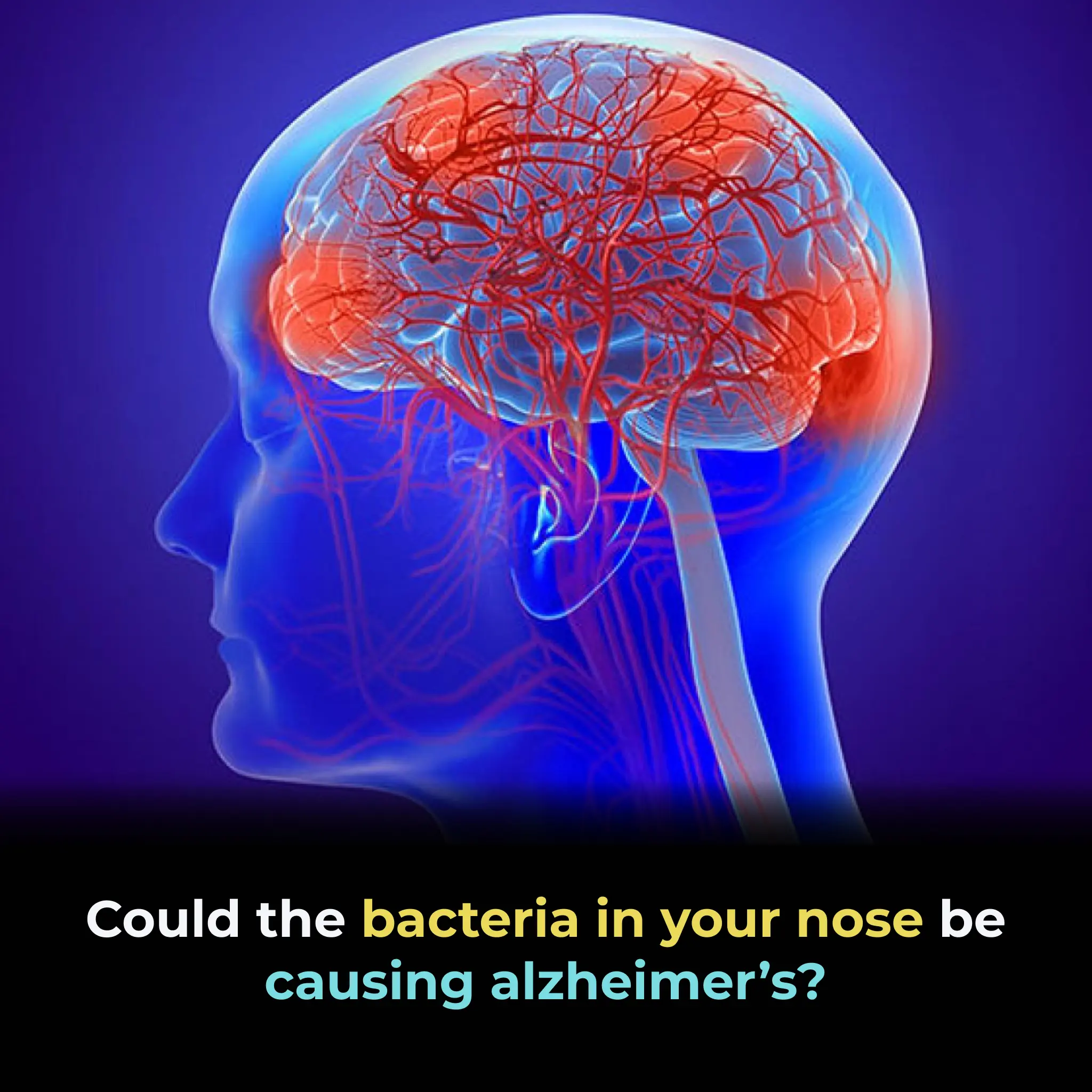
Could the bacteria in your nose be causing Alzheimer’s?
It may sound strange, but new research suggests that something as ordinary as touching or picking your nose could potentially influence your risk of Alzheimer’s disease. Recent studies are uncovering a surprising connection between nasal bacteria and the brain changes seen in Alzheimer’s patients, offering a fresh perspective on how this devastating condition might develop.
Key Takeaways
-
Certain bacteria can travel from your nose to your brain via the olfactory nerve.
-
Chlamydia pneumoniae may trigger amyloid beta plaques, a hallmark of Alzheimer’s.
-
Common habits like nose picking and plucking nose hairs can increase infection risk.
-
Loss of smell may serve as an early warning sign of Alzheimer’s.
-
Protective measures, even simple daily habits, could help reduce long-term risk.
-
Maintaining nasal hygiene and monitoring sensory changes may become part of brain health strategies.

Your Nose: A Direct Pathway to Your Brain
Most people see the nose as a simple respiratory organ, but the olfactory nerve creates a direct connection to the brain. Unlike most body parts, this nerve bypasses the blood-brain barrier, which normally protects the central nervous system from pathogens. This unique pathway can potentially allow bacteria and viruses to enter the brain more easily.
Professor James St John and his team at Griffith University focused on Chlamydia pneumoniae, a bacterium commonly linked to respiratory infections. They found that this bacteria could infiltrate the brain through nasal passages, triggering amyloid beta deposits identical to those found in Alzheimer’s patients.
How Bacteria Affect Brain Function
Once bacteria like Chlamydia pneumoniae reach the brain, they don’t remain harmless. The brain’s immune system reacts by depositing amyloid beta proteins—the sticky plaques characteristic of Alzheimer’s disease.
Over time, these plaques interfere with normal brain processes, leading to memory loss, cognitive decline, and other neurological symptoms. These findings suggest Alzheimer’s may not only be age-related but could also involve an infectious component.
Daily Habits That Could Increase Your Risk

The study highlights two very common habits that can damage the nasal lining, creating an entry point for bacteria:
-
Nose Picking
-
Plucking Nose Hairs
These seemingly harmless actions can harm the delicate mucous membranes, making it easier for bacteria to reach the brain. Researchers emphasize that protecting this natural barrier should be a priority for long-term brain health.
New Additions: Consider using saline sprays or gentle nasal rinses to maintain nasal hygiene. Avoid overly aggressive cleaning that could irritate or damage the mucosa.
Smell Loss: A Possible Early Warning
Loss of smell is often one of the earliest indicators of Alzheimer’s, sometimes preceding noticeable memory decline by years. Regular smell testing from around age 60 could serve as a useful screening tool.
-
Notice changes in your ability to detect familiar scents? Discuss it with a healthcare provider.
-
Smell loss aligns with the same olfactory pathway bacteria use to reach the brain, linking infection risk and sensory decline.
New Additions: Monitoring other early sensory changes, such as taste or subtle cognitive lapses, might also provide clues for early intervention.
Practical Steps for Prevention
While further studies are needed to confirm these findings in humans, there are actionable steps you can take today:
-
Avoid picking your nose and plucking nose hairs.
-
Maintain nasal hygiene with gentle saline sprays or rinses.
-
Strengthen your immune system with a balanced diet, regular exercise, and adequate sleep.
-
Stay up-to-date with vaccines and manage respiratory infections promptly to reduce bacterial risk.
Small changes in daily habits could have long-term protective effects on brain health.
New Additions: Reducing exposure to environmental pollutants, avoiding smoking, and staying hydrated can further support nasal and cognitive health.
Looking Ahead: The Future of Alzheimer’s Prevention
This research highlights the intricate connections between different body systems. Nasal health, olfactory function, and brain health are closely intertwined. Understanding these links opens new avenues for prevention and early detection.
-
Future research may reveal strategies to target bacterial infections in the nose as a way to prevent or slow Alzheimer’s progression.
-
Cognitive health may depend not only on diet, exercise, and mental stimulation but also on maintaining the health of often-overlooked body parts like the nasal passages.
News in the same category


How to treat nerve pain in the foot, toes & legs

Bee venom wiped out 100% of aggressive breast cancer cells in just 6 hours

10 Ways to Lower Uric Acid Naturally

6 Foods That Can Drain Your Calcium and Weaken Bones

How to treat nerve pain in the foot, toes & legs …

Scientists identify the only two foods consistently linked to higher cancer risk

COULD THE BACTERIA IN YOUR NOSE BE CAUSING ALZHEIMER’S?

The Shocking Impact of Honey with Cloves on Your Health

Clear Your Lungs and Soothe Your Cough Naturally with Onion Remedy

Guava Leaf Tea: A Simple Habit With Powerful Health Benefits

The single move that instantly clears congestion and drains your sinuses

This common diabetes medication may undo the benefits of your workouts

Your legs have a “second heart” — and one simple move can reactivate it fast

9 cancer warning signs your body is sending you (don’t ignore these!)

Here’s the secret why everyone puts avocados on the fire!

Scientifically Proven Benefits of Pumpkin Seeds (Pepitas) and Pumpkin Seed Oil

The single move that instantly clears congestion and drains your sinuses

11 Health Warnings Your Fingernails May Be Sending
News Post

Vaseline Uses and Benefits for Skin, Lips, and Hair

10 simple ways to reduce dust at home that most people overlook

You’re Doing It All Wrong: Here’s the Right Way to Defrost Frozen Pipes

7 Powerful Fruits to Preserve Muscle Strength and Energy After 50

I Didn’t Know!

The #1 FASTEST way to reverse fatty liver naturally

How to treat nerve pain in the foot, toes & legs

The air conditioner only has wind but is not cool. Don't rush to call a repairman and waste money. If you do this, it will be cold.

The more flowers the money tree has, the more luck it attracts: Do this and the money tree flowers will grow 5 times faster.

When boiling duck, don't add ginger and cold water. Add this to remove all the bad smell from the meat and you won't get tired of eating it.

Avocado Seeds: The Overlooked Nutritional Power Inside the Fruit

Bee venom wiped out 100% of aggressive breast cancer cells in just 6 hours

A New Breakthrough: Magnetic Microrobots Designed to Navigate Blood Vessels and Stop Strokes

10 Ways to Lower Uric Acid Naturally

A Dual Climate Solution: Solar Panels Over Canals Could Save Billions of Gallons of Water

Regenerative Medicine Milestone: Stem-Cell Trial Restores Motor Function in Paralyzed Patients

From Crow to Cleaner: How Feathered Geniuses Are Fighting Litter in Spain

6 Foods That Can Drain Your Calcium and Weaken Bones
